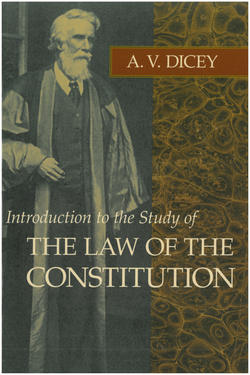Читать книгу Introduction to the Study of the Law of the Constitution - A. V. Dicey - Страница 10
На сайте Литреса книга снята с продажи.
Оглавление[print edition page xxxi]
ANALYSIS OF INTRODUCTION
| Aim | xxxv |
| The Sovereignty of Parliament | xxxvi |
| Possible change in constitution of parliamentary sovereign (Parliament Act, 1911) | xxxvi |
| State of things before passing Act | xxxviii |
| Direct effects of Parliament Act | xxxix |
| (1) Money Bill—House of Lords no veto | xxxix |
| (2) Other public Bills—House of Lords has only suspensive veto | xl |
| (3) House of Commons has unlimited legislative power | xli |
| Practical change in area of parliamentary sovereignty (Relation of the Imperial Parliament to Dominions) | xlii |
| First question—What is the difference between such relation in 1884 and 1914? | xlii |
| Second question—What changes of opinion caused the change of relation? | l |
| The Rule of Law | lx |
| Decline in reverence for rule of law | lv |
| Comparison between present official law of England and present droit administratif of France | lxi |
| Conventions of the Constitution | lxvi |
| First question—What changes? | lxvi |
[print edition page xxxii]
| Second question—What is the tendency of new conventions? | lxxii |
| Third question—Does experience of last thirty years confirm principles laid down as to connection between conventions and rule of law? | lxxv |
| Development during the last Thirty Years of New Constitutional Ideas | lxxvi |
| Two general observations on new constitutional ideas | lxxvi |
| First observation—Slow growth of political or constitutional inventiveness | lxxvi |
| Second observation—These new ideas take no account of one of the ends which good legislation ought to attain | lxxvii |
| Criticism of the Four New Constitutional Ideas | lxxx |
| Woman Suffrage | lxxx |
| The causes of demand | lxxxi |
| The two main lines of argument and answers | lxxxi |
| First argument—Every citizen entitled to vote | lxxxi |
| Second argument—Difference of sex no ground for difference of political rights | lxxxii |
| Proportional representation | lxxxiv |
| The three propositions on which argument in favour of proportional representation is based | lxxxiv |
| The truth of two first propositions admitted | lxxxiv |
| Objections to third proposition | lxxxvi |
| First objection—Complication of system increases power of wire-pullers | lxxxvi |
| Second objection—House of Commons is not mere House for Debate | lxxxvii |
| Third objection—Proportional representation increases number and evil of parliamentary groups | lxxxviii |
| Federalism | xci |
| Leading characteristics of federal government | xciii |
| Characteristics of federal government in relation to Imperial Federalism | xcviii |
| First objection—Attempt to form federal constitution for Empire full of difficulty and peril | xcix |
[print edition page xxxiii]
| Second objection—No real necessity for formation of any new federal constitution for Empire | ciii |
| Characteristics of federal government in relation to Home Rule all round (i.e. federalisation of United Kingdom) | civ |
| Vagueness of the ideas which support the policy of federalisation of United Kingdom (Home Rule all round) | cv |
| Specific objections to Home Rule all round | cvi |
| First objection—No desire for Federalism in any part of United Kingdom | cvi |
| Second objection—Federalisation of United Kingdom does not promote Imperial Federalism | cvii |
| Third objection—Such federalisation opposed to whole history of English constitutionalism | cvii |
| The Referendum | cviii |
| Meaning of referendum | cviii |
| Causes for demand for referendum | cx |
| The main argument against the referendum | cxi |
| The main argument in favour of the referendum | cxiv |
| Conclusions | cxvii |
